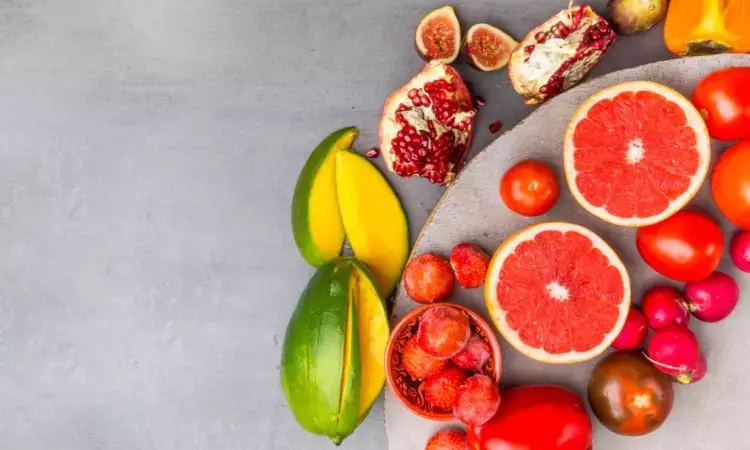- Home
- Medical news & Guidelines
- Anesthesiology
- Cardiology and CTVS
- Critical Care
- Dentistry
- Dermatology
- Diabetes and Endocrinology
- ENT
- Gastroenterology
- Medicine
- Nephrology
- Neurology
- Obstretics-Gynaecology
- Oncology
- Ophthalmology
- Orthopaedics
- Pediatrics-Neonatology
- Psychiatry
- Pulmonology
- Radiology
- Surgery
- Urology
- Laboratory Medicine
- Diet
- Nursing
- Paramedical
- Physiotherapy
- Health news
- Fact Check
- Bone Health Fact Check
- Brain Health Fact Check
- Cancer Related Fact Check
- Child Care Fact Check
- Dental and oral health fact check
- Diabetes and metabolic health fact check
- Diet and Nutrition Fact Check
- Eye and ENT Care Fact Check
- Fitness fact check
- Gut health fact check
- Heart health fact check
- Kidney health fact check
- Medical education fact check
- Men's health fact check
- Respiratory fact check
- Skin and hair care fact check
- Vaccine and Immunization fact check
- Women's health fact check
- AYUSH
- State News
- Andaman and Nicobar Islands
- Andhra Pradesh
- Arunachal Pradesh
- Assam
- Bihar
- Chandigarh
- Chattisgarh
- Dadra and Nagar Haveli
- Daman and Diu
- Delhi
- Goa
- Gujarat
- Haryana
- Himachal Pradesh
- Jammu & Kashmir
- Jharkhand
- Karnataka
- Kerala
- Ladakh
- Lakshadweep
- Madhya Pradesh
- Maharashtra
- Manipur
- Meghalaya
- Mizoram
- Nagaland
- Odisha
- Puducherry
- Punjab
- Rajasthan
- Sikkim
- Tamil Nadu
- Telangana
- Tripura
- Uttar Pradesh
- Uttrakhand
- West Bengal
- Medical Education
- Industry
Carotenoid Supplementation Shows Potential for Improving Blood Sugar Control in Type 2 Diabetes, Study Reveals

Germany: A recent systematic review and meta-analysis of randomized clinical trials has explored the potential effects of carotenoid supplementation on blood sugar control, particularly in individuals with type 2 diabetes (T2D). It found that carotenoid supplementation enhanced glycemic parameters, particularly in individuals with type 2 diabetes.
The researchers noted, "However, the certainty of the evidence was quite low, primarily due to small sample sizes and indirect findings. As a result, no specific recommendations can be made at this time, and well-designed randomized controlled trials are necessary."
The findings were published online in the European Journal of Clinical Nutrition.
Carotenoids are naturally occurring pigments in fruits and vegetables associated with various health benefits. Considering this, Nafiseh Shokri-Mashhadi, German Center for Diabetes Research (DZD), Partner Düsseldorf, Muenchen-Neuherberg, Düsseldorf, Germany, and colleagues conducted a systematic review and meta-analysis to evaluate the impact of carotenoid supplementation on glycemic indices and the reliability of the evidence.
For this purpose, a systematic literature search was performed across PubMed, SCOPUS, ISI–Web of Science, and the Cochrane Library, covering studies from inception until June 17, 2024. Randomized controlled trials (RCTs) that examined the effects of carotenoid supplementation on circulating glycemic parameters were included. Records were excluded if they involved co-interventions with other nutrients, did not report mean differences (MDs) and standard deviations (SDs) for outcomes, or used whole foods instead of carotenoid supplements.
Summary mean differences (MDs) between the intervention and control groups were calculated using a random-effects model. The risk of bias in the included studies was evaluated using the Risk of Bias 2.0 (RoB 2.0) tool.
Based on the review, the researchers reported the following findings:
- A total of 36 publications, encompassing 45 estimated effect sizes, were included in the meta-analyses.
- The results indicated a significant improvement in fasting blood glucose (FBG) levels, with a mean difference (MD) of −4.54 mg/dl, and hemoglobin A1C (HbA1C), which showed an MD of −0.25% in the intervention group compared to the control group.
- Among individuals with T2D, supplementation with astaxanthin and fucoxanthin resulted in a reduction in FBG by 4.36 mg/dl.
- The intervention with crocin was particularly noteworthy, leading to a decrease in FBG levels by 13.5 mg/dl (n = 5) and a reduction in HbA1C by 0.55% (n = 5) among T2D patients.
- The researchers emphasized that the certainty of the evidence was very low.
"While carotenoid supplementation may offer some benefits for glycemic control, particularly in individuals with type 2 diabetes, the current evidence lacks the robustness to guide clinical practice. Healthcare providers and patients should approach carotenoid supplementation cautiously until more conclusive research is available," the researchers concluded.
Reference:
Baechle, C., Schiemann, T., Schaefer, E., Barbaresko, J., & Schlesinger, S. (2024). Effects of carotenoid supplementation on glycemic control: A systematic review and meta-analysis of randomized clinical trials. European Journal of Clinical Nutrition, 1-13. https://doi.org/10.1038/s41430-024-01511-y
Dr Kamal Kant Kohli-MBBS, DTCD- a chest specialist with more than 30 years of practice and a flair for writing clinical articles, Dr Kamal Kant Kohli joined Medical Dialogues as a Chief Editor of Medical News. Besides writing articles, as an editor, he proofreads and verifies all the medical content published on Medical Dialogues including those coming from journals, studies,medical conferences,guidelines etc. Email: drkohli@medicaldialogues.in. Contact no. 011-43720751


